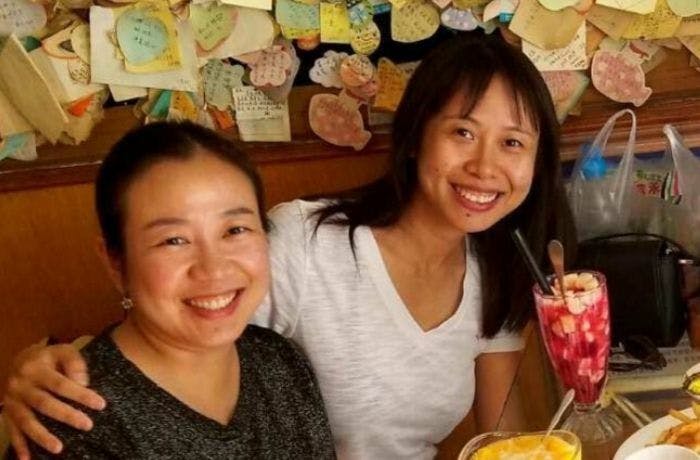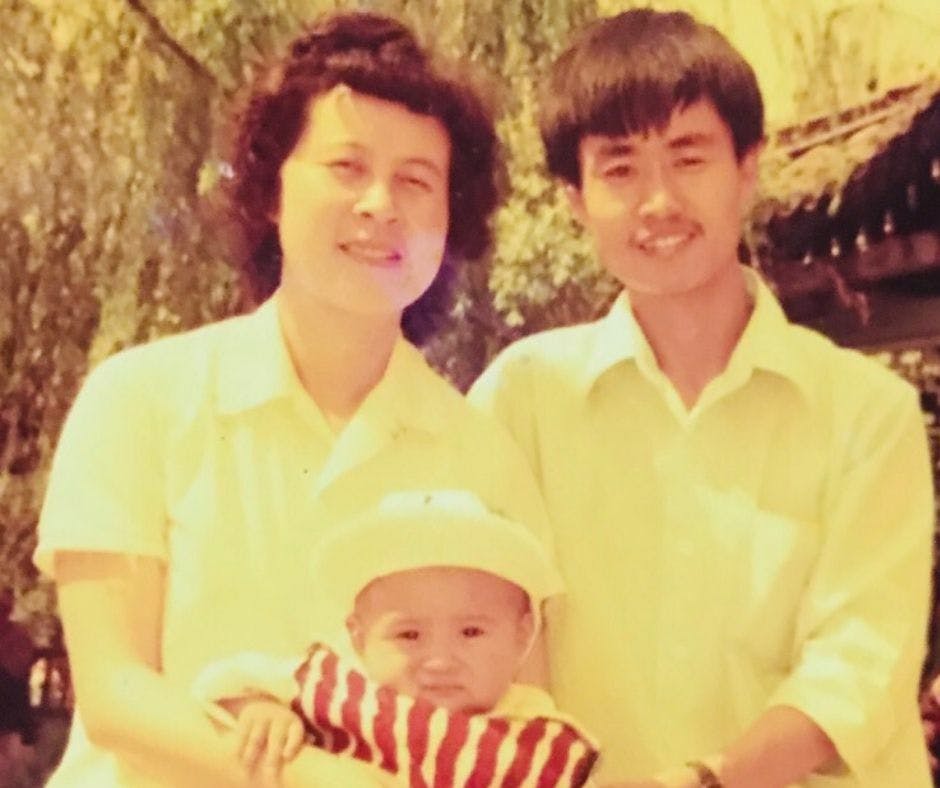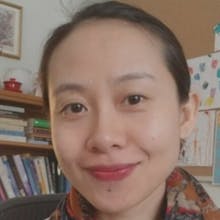The Daughter Away: A Chinese American Daughter’s Reflection during COVID-19
by Min Cheng

The author (right) with her parents the year she moved to the U.S. for graduate school.
“Ask the kids to keep their voice down,” Dad said over WeChat, “Don’t let the neighbors hear them.”
Part of me wanted to respond with a firm and righteous: “Dad, this is rural Massachusetts. I’m not going to ask my kids to keep their voice down in our own backyard.” Another part of me, perhaps the more Chinese part, resisted the urge and simply complied: “Okay, Dad. Don’t worry about us.”
For the last couple of days, my father has had repeated nightmares about our endangered lives and livelihood. In one dream, he and my husband went out for a walk and he realized in a panic that my husband had gotten lost. In another, I called home crying and begging him for money. None of these scenarios has ever happened. Nevertheless, the mere fact that my father, a gritty and unsentimental Chinese man, told me about his anxiety dreams speaks volumes about his apprehension on our behalf.
Like many first-generation Chinese immigrants, I have been dealing with COVID-19 since early January, first indirectly and then directly. As one of my Chinese friends joked, from mid-March onward is but our “second-half.”
Between early January and the end of February, I was the one who was worried about the wellbeing of my parents, grandparents, and extended family in China. Although my hometown Kunming sat thousands of miles away from Wuhan, the virus travelled far and fast.
Having lived in the U.S. for more than a decade, I have in a sense lost touch with my motherland. In fact, I stopped following mainstream Chinese media a long time ago. At first, this disconnection felt alarming: having grown up with CCTV (China Central Television) evening news in the background of every supper, in between my mother’s savory home cooking and my parents’ lively debate about current events, it felt strange not knowing what was going on in China. As the years gone by, the disconnection solidified into estrangement, and later, detachment. It was as if the more I strived to assimilate to my adoptive motherland, the more I was disconnected from my ancestral motherland. These days, what little I know about China comes primarily from posts on WeChat, one of the most popular social media apps in China.
Thanks to WeChat, I have kept abreast of the news of my family and friends back home. On any given day, my WeChat updates included my parents’ travel logs, my friends’ selfies, random ads, and Chinese national news. Starting in mid-January, however, this variety was replaced by an ominous uniformity: every single post from my families and friends was strictly coronavirus-related. It was as if a ban had been imposed on what people could post, and anything non-coronavirus was deemed disrespectful, irrelevant, and trivial.
Throughout the Lunar New Year, a holiday for family reunion, my parents practiced self-quarantine in their home. In the ensuing days, I learned that restaurants and shops were closed in my hometown; later, school opening were delayed for students. No one seemed to know what was going to happen next. As the death toll continued to rise and cities went into lockdown, I texted my parents periodically to check in. “How are you?” I would ask. “We are fine,” they would say. As the Chinese saying goes, “distant water cannot put out a nearby fire; distant family is not as good as a good neighbor.” My check-ins felt futile and inconsequential at moments like these, as there was nothing I could actually do for my parents.
During the first week of February, when my cousin Xin asked me to mail her some N-95 masks from the U.S., I went to the local CVS and found them out of stock. Not just N-95s, I couldn’t find any mask anywhere. “How is it possible?” I asked my husband, “This is rural Massachusetts.” Weeks later, Xin finally received some masks from her employer.
“Your cousin Xin just dropped off some masks for me and your dad,” Mom said cheerfully one day. Xin is the only daughter of my mother’s deceased older brother. We are only six months apart in age, and we practically grew up as sisters being the only children in our respective families. Ever since I left China, Xin has performed all the daughterly duties on my behalf: dropping off needed goods and occasional gifts for my parents, visiting them during holidays, and accompanying them to the hospital when needed. Most importantly, Xin was around.
Confucius said, “Do not travel far when your parents are still alive.” Staying close to one's parents is perhaps the most rudimentary act of filial piety in Chinese culture. It is about much more than physical presence. It is providing the assurance that parents have someone they can rely on in their old age. They took care of you when you were a baby; they took care of your babies when you were busy studying/working/otherwise pursuing your dreams; and now that they are old, you are obligated to care take of them: a full circle. No one is left unattended to or uncared for, at least in theory.

“You know, I’ve always lived in your shadow,” Xin said to me, half-joking, when I visited hometown last summer. “You’ve travelled far, first to Shanghai and then all the way to the U.S. Our whole family looks up to you, and we use you as a model when we lecture our kids. ‘Study hard,’ we say, ‘so you can go to the U.S. and join your cousin.’”
Little does she know how jealous I sometimes feel about her life. While I am the daughter away, she is the daughter at home. Having her around my aging parents simultaneously reassures and saddens me. My freedom has always been contingent on my parents’ lack of immediate physical support, their loneliness, and sacrifice. I’ve received all the benefits of being a Chinese daughter, yet with the distance between us, how am I going to fulfill my half of the circle?
Unwilling to yield to futility and inaction, at home I did what I could. With our expertise in counseling, a friend and I created a stress-reduction workshop geared towards Chinese international students whose families were impacted during COVID-19. We reached out to directors of counseling centers at local colleges and universities. Five out of five local colleges/universities decided to work with us. Five on-campus workshops were scheduled. Within just a matter of weeks, the virus outraced us. Only one was completed before colleges suspended in-person classes.
Meanwhile, my family’s “check-ins” started to change direction. Starting in early March, it was now my parents’ turn to worry about me and my family across the Pacific Ocean. Prior to that, travel restrictions were imposed on non-residents and non-citizens from China; we cancelled our usual summer visit as there would be few flights. Our separation has never been so pronounced. “How are you?” they would ask. “We are fine,” I would say. This went on for a while. We both knew that we were dealing with circumstances beyond our imagination when we first pictured my life in the U.S years ago.
“Your Auntie Zhou told me that you have the destiny of a Horse,” Mom said to me mysteriously right before I left for the U.S. “You are going to travel far and make an extraordinary fortune.” Auntie Zhou was a family friend who studied the I-Ching, the ancient book of wisdom that Chinese people use to predict the future. I knew my parents believed in Auntie Zhou’s amateur fortune-telling with all of their hearts. I knew that because I was familiar with what I could only describe as my parent’s “stubborn faith” in me.

The author as a baby, with her parents
And I use the word “faith” literally, as in “a leap of faith.” To my parents, I am capable and worthy of the best opportunities out there. A case in point: when I was in second grade, a teacher told my mother “your daughter cannot write.” I remember my mother fuming silently, her face twisted in pain. The next day, she started helping me with my essays, editing every piece of writing I did word by word. By the end of the semester, not only was I writing proper essays, I was selected to be published in the local student paper. “See, who says my daughter can’t write?” Mom practiced her faith in me with concrete actions, allowing herself to gloat only when we had achieved our goals.
For my parents, I was to travel to Shanghai for college, and then to the U.S. for graduate school. And they had not an ounce of doubt that I would deliver.
In all honesty, I was a delicate, sensitive, and easily frightened child who really just preferred to stay home. After traveling to many different provinces with my parents (Dad worked for a travel agency), I decided that my hometown was the best of all: year-round balmy weather, delicious natural foods, and simple folks. In a word, I was far from what you would imagined a typical “Horse”: ambitious, energetic, galloping in excitement toward the prospect of adventure.

The author (center) as a young girl with her parents.
“Why are you pushing me away when everyone else is trying to keep their kids close by? Do you even love me? I’m not your ‘trophy child!’” There were times when I rebelled and protested. There were times when I deliberately went against their advice, simply to prove that I was my own person.
Despite acts of rebellion, I wanted to make them proud all along. I never doubted their dedication to me, in their Chinese parents’ ways. Deep down, I always knew that if I ever needed anything, absolutely anything, they would drop everything at home and fly to my side to help me out, be it Shanghai, New York City, or rural Massachusetts. I realized that they were the true “Horses,” with their fierce dedication and enthusiastic support for me.
“Wear a mask,” Mom urged me as early as mid-February. I didn’t start wearing a mask until mid-March, and I didn’t want to explain why to her. I wasn’t sure how to tell her that Asian/Asian American folks were ridiculed, harassed, and assaulted all over the country.
In my own town, an idyllic destination surrounded by elite colleges, a place where over 40% of local residents hold a graduate or professional degree, an Asian student was verbally assaulted near a local CVS simply because she was wearing a mask. Events like this shocked me into the racial reality that was usually dormant. I could feel my heart pounding, my breathing intensified, and my entire perspective of safety permanently altered. I went through the classic “fight or flight” stage where I was overwhelmed with fear and anxiety, followed by intense anger and disillusionment, then a series of calculations: “ Shall I buy a gun?” “How do I keep my kids safe?” “What shall I do if someone attacks me?”
Casual conversations at home evolved into emotional minefields. “Mommy, someone online said that the coronavirus won’t last long because it’s ‘made in China,’” my older son said one day. It pains me that my kids, at their tender age, are veteran recipients of remarks like this. I can’t count the times when my kids have come to me with China-bashing, xenophobic, racist comments like this one.
At work, I hear casual remarks such as “These are the Chinese data; we are not sure how accurate they are” from professional colleagues during meetings I participate in. Others offer racial stereotypes and conspiracy theories, often apparently without any idea that they are deeply offensive to me.
Moments like these make me doubt my choice to come and stay in this country in the first place. Moments like these made me empathic towards Japanese Americans, who suffered from racism and incarceration during the internment years.
But moments like these are not to be shared with my parents. I didn’t want to worry my parents as much as they didn’t want to burden me. Years of navigating a foreign system on my own has taught me how to survive in compromising circumstances. And just as Auntie Zhou had predicted, I’ve travelled far (no big fortunes though, not yet). I lived in two of the biggest cities in the world (Shanghai and New York), each for more than six years. I’ve travelled to many different countries in Europe, the Americas, and Asia. I’ve raised two delightful kids while studying or working full-time. I’ve chosen to work as a community psychologist, despite my parents’ preference for the ivory tower. Somehow, I’ve become a “Horse.” Perhaps I had it in me all along, only my parents had the eyes to see what I couldn’t see back then. I’m the daughter who could venture away because my parents are home. Their gaze will follow me, however far I go.
“Stock up on rice,” Mom says, “your Dad and I always buy those 25-kilo bags.”
“Yes, Mom.” She’d forgotten we’d gone mostly Paleo for years. But who cares, if that makes my parents feel like their daughter, son-in-law, and grandchildren are going to be okay.

Min Cheng
Get Insights In your Inbox
Join our community and receive updates about our latest offerings - resources, events, learning groups, and news about all matters race and kids in the US.
Subscribe


